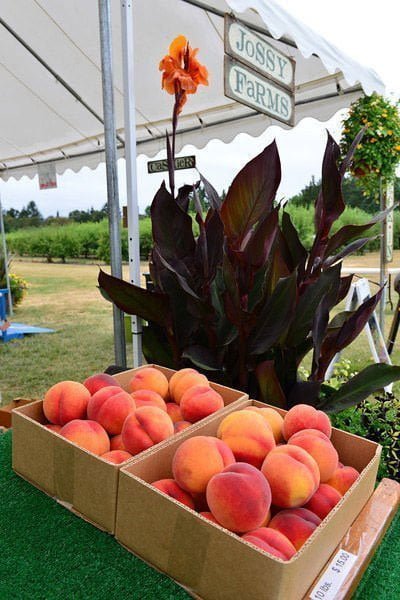 For more than ten years, I have taken a road trip out to Jossy Farms in West Hillsboro every summer to pick what I considered the best peaches in the area. It was one of those things my friends and I look forward to every year, and led to a long afternoon of blanching, peeling and processing fifty pounds or more of peaches for use throughout the year. My house would smell like peach juice for days afterwards, and tossing a few slices of peach onto my oatmeal shed a bit of sunlight on dark winter days.
For more than ten years, I have taken a road trip out to Jossy Farms in West Hillsboro every summer to pick what I considered the best peaches in the area. It was one of those things my friends and I look forward to every year, and led to a long afternoon of blanching, peeling and processing fifty pounds or more of peaches for use throughout the year. My house would smell like peach juice for days afterwards, and tossing a few slices of peach onto my oatmeal shed a bit of sunlight on dark winter days.
Unfortunately, this summer ritual is coming to an end; a combination of disease and the severe cold last winter has killed 90% of Bob Jossy’s peach trees. It sounds like other peach growers in the Portland area have also experienced loss of trees, so you’ll want to check with them before you head out this August to pick your fruit.
Here’s the note from Bob,
This winter was very hard for the peach trees at Jossy Farms and 90% or more of the peach trees have died. For the most part, the apple and pears are fine.
In efforts to save the trees, I have done extensive research and interviews with other farmers. For those in our farm family who wish to understand the mysteries of Mother Nature, I have done my best to explain what happened.
There is a common disease, known as Bacterial Canker that affects many plants and especially stone fruits (peaches, cherries and prunes). Bacterial Canker is caused by a bacterium called Pseudomonas Syringae. When infected with Pseudomonas Syringae the temperature in which the cells of a tree can freeze raises and then the disease attacks those frozen cells with a toxin. When too many cells are destroyed the tree weakens and dies. If you wish to research this, it is called Ice Nucleation Activity, I found it very interesting.
This year’s weather was the perfect combination for Pseudomonas Syringae to attack and have a devastating effect. Winter temperatures dropped to an unusual low, between 0 and 5 degrees. This caused enough cell damage to kill about 70% of the trees this winter before they leafed out. The other 30% leafed out but the Pseudomonas Syringae had gained a stronger foot hold in these trees. Following the rough winter was a long, cold and wet spring. This stressed the trees to the extent they could no longer fight the Pseudomonas Syringae and the disease killed the trees. At this point today, there is about 10% of the peach trees still alive. With 40 plus years of growing peaches on this land, there is a lot of Pseudomonas Syringae around the farm. Many other plants can be hosts, such as weeds, grasses, hazelnuts and other wild trees but are unaffected by the disease. Through all my research, I have come to the conclusion that the chances to replant and grow peaches on this property successfully are very low.
At this stage of the disease in the orchard, all it would take is a spring of similar caliber to cause young peach trees to die. Young trees are the most susceptible. We have and would plant peach trees that are resistant to the disease but no variety of peaches are immune to Bacterial Canker For this reason and many others, we have decided that this is the last year we will grow and sell peaches. After this harvest, we will pull out the peach trees and plant this ground to hazelnuts. We plan to keep the apple and pear trees. This is a very hard decision for me to make. I believe it is the right decision but I am having a hard time getting behind it. We will be open this summer with a limited supply of peaches and ample pears and apples. We will not be pulling out the dead trees prior to harvest. You will also notice that the property around the orchard has developed. Please know that we were not involved in that development and it had no bearing on our decision.
Most peach growers in the north valley had damage to their trees from this winter and spring but we seem to have the most extensive damage. I guess we have always been over achievers. While I may not have known your name, I considered many of you friends and enjoyed and looked forward to our conversations every year. Some of you have heard me say I would probably be selling fruit until I fall over dead in the orchard. I think I like this outcome better. I hope to see many of you this season when we can talk about this situation and hopefully find humor in it. The peach orchard was not only a large part of my livelihood but my legacy and this is not a change I take lightly.
I now have my own ending to an old saying. When life gives you lemons make lemonade. When Mother Nature kills your lemon trees plant something else.
Bob and Mary Leighton says
Your peaches have been the best ever. Thanks for you and your family’s dedication.